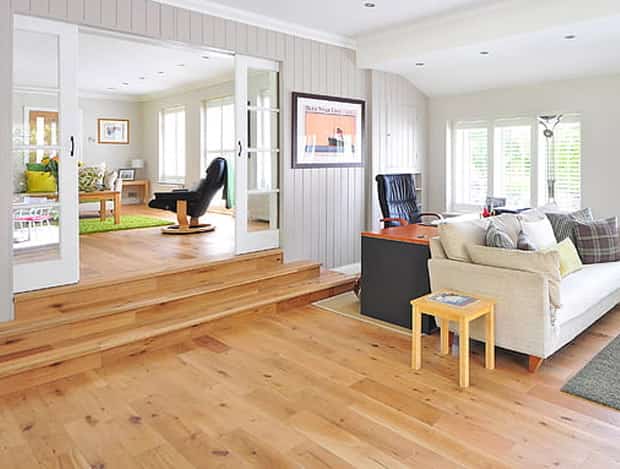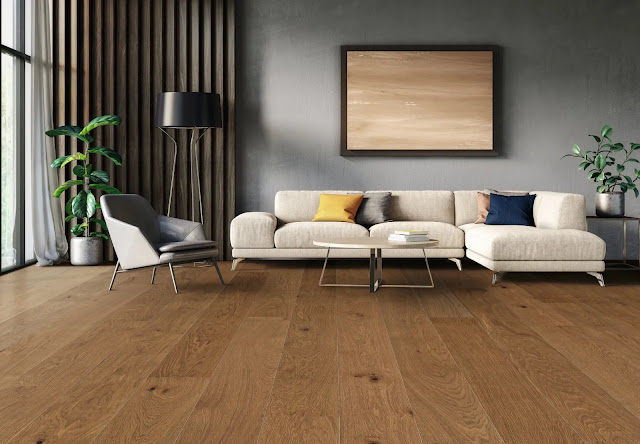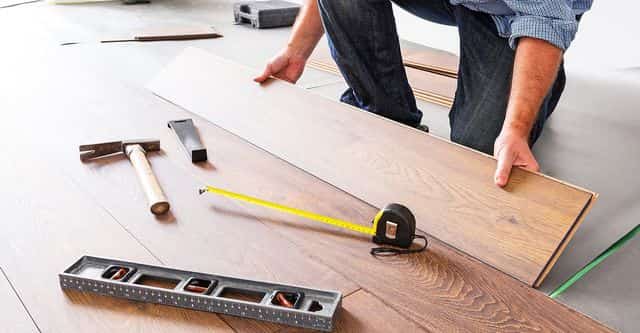Unlocking the Beauty Beneath Your Feet: Tips on Refinishing and Repurposing Existing Flooring Materials
 |
| Image Source |
1. Introduction
When it comes to home improvement, flooring is often overlooked. Many homeowners rush to replace old or worn-out floors without considering the potential of refinishing and repurposing existing materials.
This not only saves you money but also allows you to preserve the character and history of your home. In this comprehensive guide, we will explore the world of refinishing and repurposing flooring materials, providing you with a step-by-step roadmap to transform your space.
Refinishing and repurposing existing flooring materials is an eco-friendly and budget-conscious way to revamp your space. By breathing new life into old materials, you not only reduce waste but also preserve the character and charm of your home.
Whether you have hardwood, laminate, or even reclaimed materials, these tips will help you unlock the hidden beauty beneath your feet.
Before you embark on your refinishing journey, it's crucial to assess the condition of your existing flooring. Take note of any damage, wear, or discoloration. Knowing what you're dealing with will help you make informed decisions about whether to refinish or repurpose.
If you're considering repurposing, you'll need to identify suitable materials that complement your existing flooring. This could be anything from reclaimed wood to ceramic tiles. Matching the materials will be key to achieving a cohesive look.
Sanding is the foundation of any refinishing project. It's essential to strip away the old finish and reveal the natural beauty of the material beneath. Once sanded, staining can add depth and character to your floors. Choose a stain that complements your decor and enhances the wood's natural grain.
Inspect your floors for any damaged areas, such as scratches, dents, or holes. Repair these issues before refinishing to ensure a smooth and polished final result. This may involve patching, filling, or replacing damaged planks.
Applying a Finish
After sanding and staining, applying a finish is the final step in the refinishing process. Choose between oil-based or water-based polyurethane, each with its own set of advantages. A finish not only adds a protective layer but also enhances the visual appeal of your floors.
One of the most exciting aspects of repurposing is the opportunity to create unique patterns. Consider using different materials to create stunning designs, like herringbone patterns, borders, or mosaics. The possibilities are limited only by your creativity.
Mixing materials can be a game-changer in repurposing projects. Combine hardwood with tile, stone, or even glass to create a one-of-a-kind flooring masterpiece. This eclectic approach adds depth and visual interest to your space.
Repurposing allows you to explore various design possibilities. You can choose from a wide range of colors, textures, and patterns to achieve the desired aesthetic. Whether you want a rustic, modern, or eclectic look, repurposing opens doors to endless design opportunities.
Embracing sustainability, you can opt to recycle and upcycle materials. Reclaimed wood, salvaged tiles, or repurposed industrial materials are excellent choices. By giving new life to old materials, you contribute to the reduction of environmental impact.
Consider using eco-friendly finishing products to minimize your carbon footprint. Water-based stains and finishes have lower VOC emissions and are less harmful to both your health and the environment. Sustainable options align with the principles of responsible home improvement.
To ensure the longevity of your refinished or repurposed floors, it's essential to implement proper care and cleaning routines. Regularly sweep, vacuum, or mop to remove dirt and debris. Use appropriate cleaning products to maintain the finish and protect the surface.
Investing in high-quality finishes and materials is key to ensuring lasting results. Protect your floors from heavy furniture and sharp objects, and consider using rugs and mats in high-traffic areas. Regular maintenance and preventive measures will keep your floors looking stunning for years to come.
One of the primary reasons for choosing refinishing and repurposing is cost savings. Calculate your budget, including materials, tools, and labor if necessary. Be realistic about your financial limitations and explore options that align with your budget.
Consider the long-term value of your project. While refinishing and repurposing may seem cost-effective, they can significantly increase the value of your home. A well-executed project can enhance the aesthetics and resale potential of your property.
Refinishing and repurposing existing flooring materials are transformative processes that allow you to bring out the hidden beauty of old materials and infuse new life into your living space.
Whether you choose to refinish your hardwood floors, create stunning patterns with different materials, or explore sustainable options, these tips will guide you toward a successful project. Embrace the charm of the old and the promise of the new, and watch your floors become a centerpiece of your home's beauty and functionality.
This not only saves you money but also allows you to preserve the character and history of your home. In this comprehensive guide, we will explore the world of refinishing and repurposing flooring materials, providing you with a step-by-step roadmap to transform your space.
Refinishing and repurposing existing flooring materials is an eco-friendly and budget-conscious way to revamp your space. By breathing new life into old materials, you not only reduce waste but also preserve the character and charm of your home.
Whether you have hardwood, laminate, or even reclaimed materials, these tips will help you unlock the hidden beauty beneath your feet.
2. Assessment and Preparation
Evaluating the Existing Flooring
Before you embark on your refinishing journey, it's crucial to assess the condition of your existing flooring. Take note of any damage, wear, or discoloration. Knowing what you're dealing with will help you make informed decisions about whether to refinish or repurpose.
Identifying Suitable Materials
If you're considering repurposing, you'll need to identify suitable materials that complement your existing flooring. This could be anything from reclaimed wood to ceramic tiles. Matching the materials will be key to achieving a cohesive look.
3. Refinishing Techniques
Sanding and Staining
Sanding is the foundation of any refinishing project. It's essential to strip away the old finish and reveal the natural beauty of the material beneath. Once sanded, staining can add depth and character to your floors. Choose a stain that complements your decor and enhances the wood's natural grain.
Repairing Damaged Areas
Inspect your floors for any damaged areas, such as scratches, dents, or holes. Repair these issues before refinishing to ensure a smooth and polished final result. This may involve patching, filling, or replacing damaged planks.
Applying a Finish
After sanding and staining, applying a finish is the final step in the refinishing process. Choose between oil-based or water-based polyurethane, each with its own set of advantages. A finish not only adds a protective layer but also enhances the visual appeal of your floors.
4. Repurposing Ideas
Creating Unique Patterns
One of the most exciting aspects of repurposing is the opportunity to create unique patterns. Consider using different materials to create stunning designs, like herringbone patterns, borders, or mosaics. The possibilities are limited only by your creativity.
Mixing Different Materials
Mixing materials can be a game-changer in repurposing projects. Combine hardwood with tile, stone, or even glass to create a one-of-a-kind flooring masterpiece. This eclectic approach adds depth and visual interest to your space.
Exploring Design Possibilities
Repurposing allows you to explore various design possibilities. You can choose from a wide range of colors, textures, and patterns to achieve the desired aesthetic. Whether you want a rustic, modern, or eclectic look, repurposing opens doors to endless design opportunities.
5. Sustainability and Eco-Friendly Options
Recycling and Upcycling
Embracing sustainability, you can opt to recycle and upcycle materials. Reclaimed wood, salvaged tiles, or repurposed industrial materials are excellent choices. By giving new life to old materials, you contribute to the reduction of environmental impact.
Sustainable Finishing Products
Consider using eco-friendly finishing products to minimize your carbon footprint. Water-based stains and finishes have lower VOC emissions and are less harmful to both your health and the environment. Sustainable options align with the principles of responsible home improvement.
6. Maintenance and Longevity
Proper Care and Cleaning
To ensure the longevity of your refinished or repurposed floors, it's essential to implement proper care and cleaning routines. Regularly sweep, vacuum, or mop to remove dirt and debris. Use appropriate cleaning products to maintain the finish and protect the surface.
Ensuring Lasting Results
Investing in high-quality finishes and materials is key to ensuring lasting results. Protect your floors from heavy furniture and sharp objects, and consider using rugs and mats in high-traffic areas. Regular maintenance and preventive measures will keep your floors looking stunning for years to come.
7. Cost Considerations
Budgeting for Your Project
One of the primary reasons for choosing refinishing and repurposing is cost savings. Calculate your budget, including materials, tools, and labor if necessary. Be realistic about your financial limitations and explore options that align with your budget.
Cost vs. Value
Consider the long-term value of your project. While refinishing and repurposing may seem cost-effective, they can significantly increase the value of your home. A well-executed project can enhance the aesthetics and resale potential of your property.
8. Conclusion
The Beauty of Old and the Promise of New
Refinishing and repurposing existing flooring materials are transformative processes that allow you to bring out the hidden beauty of old materials and infuse new life into your living space.
Whether you choose to refinish your hardwood floors, create stunning patterns with different materials, or explore sustainable options, these tips will guide you toward a successful project. Embrace the charm of the old and the promise of the new, and watch your floors become a centerpiece of your home's beauty and functionality.



Comments
Post a Comment